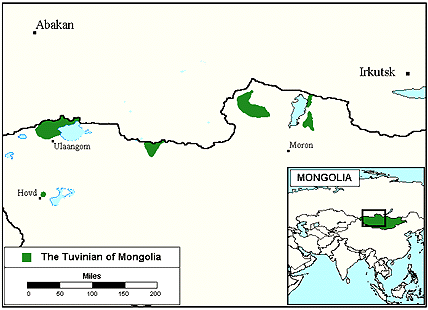|
|
Prayer Profile
The Tuvinian of Mongolia
![[IMAGE]](../images4/0655.jpg) The Tuvinian in Mongolia number about 31,000. They inhabit a harsh mountainous region in the northern part of the country, near the border of Russia. There, the summers are hot and dry, while the winters are bitterly cold. Still, this region can have as many as 300 sunny days a year, and the extremely dry air helps people to withstand the cold winters and the hot summers.
The Tuvinian in Mongolia number about 31,000. They inhabit a harsh mountainous region in the northern part of the country, near the border of Russia. There, the summers are hot and dry, while the winters are bitterly cold. Still, this region can have as many as 300 sunny days a year, and the extremely dry air helps people to withstand the cold winters and the hot summers.
Because the Tuvinian, like other Russian settlers, left their home territories in the Soviet Union many years ago and immigrated to Mongolia; their present "national" status is disputed. Some Tuvinian clans in Mongolia have maintained their native language, ethnic background, and traditional culture. Other Tuvinian clans have been absorbed by the Mongolian culture. Their original language, Tuvin, contains many Mongolian words and uses the Cyrillic script. Most Mongolian Tuvinian also speak Halh, the national language of Mongolia.
What Are Their Lives Like?
Most Tuvinian raise livestock for a living. They also hunt and do a limited amount of farming. Oats, barley, wheat, and millet, are the principal crops raised. Recently, farmers from northern China have introduced the Tuvinian to vegetable farming.
Many of the Tuvinian still live as nomadic shepherds, migrating seasonally with their herds. Those who inhabit the plains traditionally live in large felt tents called gers or yurts. Those in Siberia usually live in round tents made from bark.
The main industrial activity in the Tuvinian Republic is mining, especially for asbestos, cobalt, coal, gold, and uranium. Other industries include processing food, crafting leather or wood items, and manufacturing building materials.
The Tuvinian diet primarily consists of meat (mutton, beef, horse, goat, camel, reindeer, and wild game), fish, roots, cedar nuts, and dairy products. The Tuvinian enjoy drinking airag (fermented milk) on special occasions.
In times past, Tuvinian marriages were arranged by the parents, and couples married when they reached the age of 12 or 13. Today, the minimum age for marriage is 18 and parental consent is no longer necessary. A young bride formerly lived with the husband's family, but today the couple's home is determined by their economic conditions. Divorce is common among the Tuvinian and abortion is often used as a form of birth control.
The Tuvinian culture is noted for its rich, oral epic poetry and its music. The Tuvinian use more than fifty different musical instruments, and traveling ensembles often perform outdoors.
What Are Their Beliefs?
The Tuvinian were traditionally shamanists (believed in an unseen world of gods, demons, and ancestral spirits) and Tibetan Buddhists. Today, one third of the Tuvinian are Buddhists, one third are shamanists, and the remaining one third are non-religious.
Tibetan Buddhism was first embraced by the Tuvinian in the 1700's. In the 1930's, the Soviets destroyed nearly all of the Buddhist monasteries, and all the monks were dispersed; some were even shot. Recently, however, a Buddhist community was officially registered in the Tuvinian Republic, and efforts are underway to rebuild a great monastery.
The influence of shamanism is still obvious among the Tuvinian. Ceremonies are held on the seventh and forty-ninth days after someone's death. The soul is believed to remain in the body of the deceased for seven days, then depart for the "kingdom of the dead," reaching its ultimate destination on the forty-ninth day.
The Tuvinian believe that all natural elements contain spirits that must be appeased with offerings. The people are dependent on shamans (medicine men) to cure the sick by magic and communicate with the spirits.
What Are Their Needs?
Until Tuva become a part of Russia, very few of the Tuvinian men and none of the women could read. Perhaps Christian teachers will have open doors to work among the Tuvinian.
Prayer Points
- Ask the Lord to call people who are willing to go to Russia and share Christ with the Tuvinian.
- Ask God to use the Tuvinian believers to share the love of Jesus with their own people.
- Pray that God will raise up qualified linguists to complete translation of the Bible into Tuvin.
- Pray that Christian radio and television broadcasts will soon be made available to the Tuvinian.
- Ask the Holy Spirit to soften the hearts of the Tuvinian toward Christians so that they will be receptive to the Gospel.
- Pray that God will open the hearts of Russia's governmental leaders to the Gospel.
- Take authority over the spiritual principalities and powers that have kept the Tuvinian bound for many generations.
- Ask the Lord to raise up strong local churches among the Tuvinian.

See also the following Group:
The Tuvinian of Russia
Statistics
Latest estimates from the World Evangelization Research Center.
THE PEOPLE
- People name: Tuvinian
- Country: Mongolian
- Their language: Tuvin
- Population:
- Largest religion:
- Christians: 1%
- Church members: 312
- Scriptures in their own language: None
- Jesus Film in their own language: None
- Christian broadcasts in their own language: None
- Mission agencies working among this people: 0
- Persons who have heard the Gospel: 6,600 (22%)
- Persons who have never heard the Gospel: 24,600 (78%)
THEIR COUNTRY
- Country: Mongolia
- Population:
- Major peoples in size order:
- Major religions:
- Number of denominations: 6
© Copyright 1997
Bethany World Prayer Center
This profile may be copied and distributed without obtaining permission
as long as it is not altered, bound, published
or used for profit purposes.
![[HOME BUTTON]](../graphics/home.jpg)
![[CALENDAR BUTTON]](../graphics/calico.jpg)
![[LIST BUTTON]](../graphics/listico.jpg)
[Home]
[Calendar]
[Country List]
|